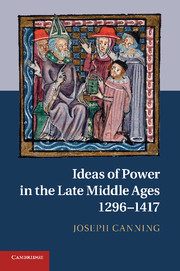Book contents
- Frontmatter
- Contents
- Preface
- Abbreviations
- Introduction
- Chapter 1 Ideas of power and authority during the disputes between Philip IV and Boniface VIII
- Chapter 2 Dante Alighieri: the approach of political philosophy
- Chapter 3 Marsilius of Padua
- Chapter 4 Power and powerlessness in the poverty debates
- Chapter 5 The treatment of power in juristic thought
- Chapter 6 The power crisis during the Great Schism (1378–1417)
- Conclusion
- Bibliography
- Index
Chapter 2 - Dante Alighieri: the approach of political philosophy
Published online by Cambridge University Press: 25 October 2011
- Frontmatter
- Contents
- Preface
- Abbreviations
- Introduction
- Chapter 1 Ideas of power and authority during the disputes between Philip IV and Boniface VIII
- Chapter 2 Dante Alighieri: the approach of political philosophy
- Chapter 3 Marsilius of Padua
- Chapter 4 Power and powerlessness in the poverty debates
- Chapter 5 The treatment of power in juristic thought
- Chapter 6 The power crisis during the Great Schism (1378–1417)
- Conclusion
- Bibliography
- Index
Summary
The tracts produced during the disputes between Philip IV and Boniface VIII were traditional in method in that they argued from authorities, mostly in a scholastic manner. In the aftermath of the conflict, a fresh approach to questions of power and legitimate authority appeared in the works of Dante Alighieri. In his political thought, Dante was proposing solutions to a prolonged political crisis which had partly ruined his own life. His highly original approach was philosophical and can be seen as a largely normative and evaluative response to an empirical problem, with its conclusions mainly derived from first principles and confirmed by historical examples. Overall he made innovative contributions to political philosophy through his method and the questions he considered. Primarily a poet, he was an amateur but well-informed student of philosophy, anxious to display his knowledge of authorities, but highly creative in his use of them.
The problems which Dante confronted were the political turmoil and fragmentation of Italy in the first two decades of the fourteenth century. He witnessed the strife within cities and the conflicts between them and with signori. He himself had been the victim of internal faction-fighting in his native Florence, having been exiled in 1302 as a member of the White Guelph faction by the Black Guelphs, who were supported by Boniface VIII. Dante was in exile for the rest of his life – the fundamental fact underlying all his subsequent writings. In political and religious terms he was an exile from Florence and from heaven. He was not a disinterested observer of politics but was personally involved, whether he liked it or not. Dante blamed Boniface in particular and the papacy in general for much of the unruly political condition of Italy, a condition which in itself contributed to the papal reluctance to return to the peninsula and its lengthening sojourn at Avignon. Dante's solution to Italy's problems was on the face of it a traditional one: the establishment of a strong Roman emperor. He became converted to this view after his exile from Florence, which he came to see as an evil city corrupted by wealth and riven with faction. He put high hopes in Henry VII of Luxemburg's expedition to Italy between 1310 and 1313, supporting him as he became increasingly involved in conflicts with the developing alliance between the papacy under Clement V and King Robert of Naples. But if the notion of an emperor was in itself far from new, Dante's method of argument to reach this position certainly was.
- Type
- Chapter
- Information
- Ideas of Power in the Late Middle Ages, 1296–1417 , pp. 60 - 80Publisher: Cambridge University PressPrint publication year: 2011



